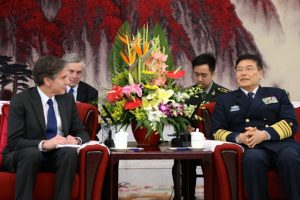U.S. policy toward China under the Biden administration is gradually taking shape. Washington will be tough on China on issues such as security, economic security, and shared values, while seeking cooperation on climate change, nuclear non-proliferation, North Korea, and Iran. Generally, the U.S. will view China as a rival rather than as an adversary.
This is the stance that has been taken by United States Deputy Secretary of State Wendy Sherman in high-level talks with China. For its part, while taking exception to its hostile treatment by the United States, Beijing is also maintaining a stance of engaging in dialogue, for example scheduling a meeting with Chinese Foreign Minister Wang Yi on the occasion of Sherman’s visit to China.
Beijing maintains that U.S. concessions still fall short. However, even on the issue of Taiwan, a policy of remaining steadfast on its “One-China policy” is gradually taking shape, even while emphasizing the “importance of peace and stability across the Taiwan Strait.” Meanwhile, United States Secretary of State Antony Blinken was at pains to say when he visited India that the Quad is not a military alliance, but a means of maintaining infrastructure development, social stability and values. Although the Quad was clearly conceived with China in mind, the U.S.-India Foreign Ministers’ Meeting did not invariably use tough language in respect of China. While Secretary of State Blinken’s meeting with the Dalai Lama makes evident the U.S. stance on China, India will want to avoid taking an overtly hardline stance.
It is interesting to observe the obvious asymmetries in the policies of the U.S. and its allies toward China. Simply put, the U.S. sees China as a rival, and adopts a tough stance on issues of security, economic security and shared values, while seeking cooperation with China in areas such as climate change, nuclear nonproliferation, North Korea, and Iran. Meanwhile, as part of its China policy, Washington has sought to emphasize the importance of its alliances and endeavor to act in alignment with them. The Quad, which consists of Japan, Australia, India, and the U.S., is one example of this. However, this emphasis on aligning with allies has been limited to military and economic security, and shared values. In other words, while the U.S. seeks to work with allies when it comes to the tougher aspects of its China policy, it does not seek to do so when it comes to cooperation with China. That dichotomy requires allies to carefully consider how they intend to respond.
America’s allies may for instance choose to take a hardline stance toward China based on an understanding of that aspect of U.S. policy alone. Yet, while they do that the U.S. will still be seeking to cooperate with China in multiple other domains. That will leave allies left to seek cooperation with China individually. In this respect, Japan and Australia have been impeded by Washington’s tough stance on China, and have been slow to approach Beijing. While both Australia and Japan have strong economic ties with China, cooperation with China in new areas such as climate change or on the issue of North Korea remains an unknown quantity. India, on the other hand, is holding back with regard to security cooperation with the U.S. in respect of China, choosing instead to work with Beijing on global public goods. Meanwhile, South Korea maintains a position that allows it to preserve the U.S.-ROK alliance while at the same time cooperating with North Korea, having managed to elicit from the U.S. an expression of intention to work with China on the North Korean issue.
It is important to remember that the U.S. and its allies are hardly monolithic when it comes to their positions on China. Japan’s policies on human rights issues, for example, do not overlap precisely with those of Western countries. Still, each country is trying as far as possible to stay in step with Washington, to the extent permitted by their individual circumstances.
When it comes to cooperating with China, on the other hand, the U.S. and its allies are more obviously out of sync. This offers an opening for Beijing to exploit the differences between the U.S. and its allies. A China policy that is resolute on some issues and cooperative on others will require the U.S. and its allies to work together more effectively.

































